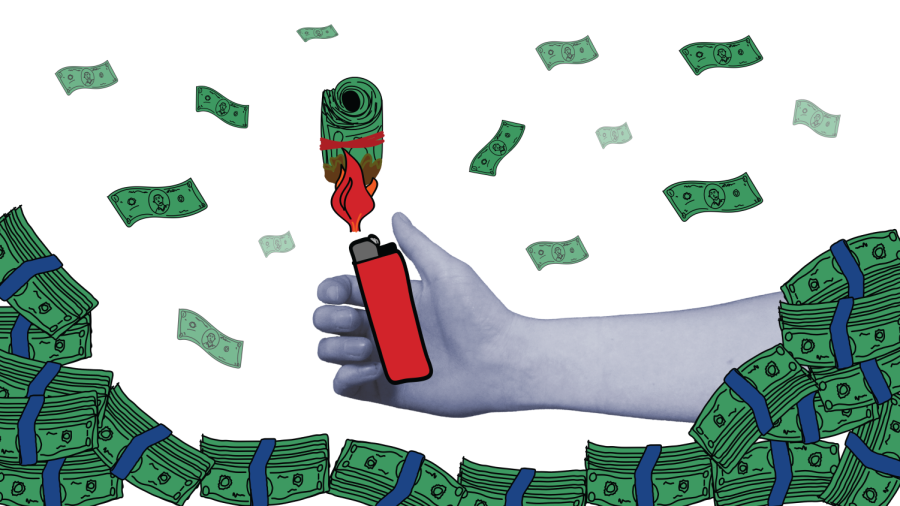Radical reputation
The highly contested phrase “tax the rich” provides a necessary wake-up call about inequalities in American society.
Taxing the rich is more necessary than many people think.
“Tax the rich” has become a phrase of controversy, classified by critics as a far-left idea that is unreasonable and unachievable. However, taxing the rich is more universally ethical and beneficial than many think based on the media attention it gets.
As income inequality increases, taxing the rich becomes increasingly important. From 1983 to 2016, the upper class’s share of wealth has grown from 60% to 79% while the middle class’s share has shrunk from 32% to 17%, according to Pew Research Center. The wealthy have plenty of money to spare; yet, they don’t pay their fair share of taxes, having a lower tax rate than those in the highest tax bracket. There are average working families who are paying a higher tax rate than billionaires. Along with the tax rates being lower, the wealthy also have an advantage in that much of their income isn’t considered taxable — they have wealth stored in their stocks or investments and can’t be taxed until the asset is sold.
There are many proposals regarding how to best tax the rich. Some suggest increasing estate taxes, creating an additional income tax, or introducing a wealth tax, which is based on a person’s total net worth and assets. This tax follows the rule that the more wealth you have, the higher the tax should be. During the 2020 presidential election, Joe Biden promised to tax the rich. He had a plan to increase income taxes for those making roughly $400,000 or more annually — only the top 2% of the population. However, with Biden’s Build Back Better proposal, a social and climate spending bill released Oct. 29, 2021, this plan changed. The framework of the bill outlines funds coming from a tax surcharge on those making $10 million a year. This is a heavy decrease from the original plan’s amount of taxation, and while it’s better than nothing, it’s not enough.
Many people worry about the idea of a wealth tax. Some fear that it will ruin the economy. However, the government doesn’t set the tax money on fire and watch it slowly turn to ashes; they return the money to the economy through investments and spending programs. According to the Institute on Taxation and Economic Policy, inequality can slow down the economy by placing too much wealth in the hands of a small group of people who are buying their sixth mansion and aren’t using their resources efficiently or are leaving them to sit in the bank. The government could use this money on infrastructure, healthcare and education, which would fuel middle-class consumers powering the economy. Additionally, many other industrialized nations like Iceland, Denmark and France collect more taxes than the U.S. and can invest far more in public goods. Meanwhile, U.S. federal spending has exceeded its revenue and can’t fund investments necessary for the economy. For those who say taxing the rich is unfair and goes against the natural order, how many times have poor people been told, “life isn’t fair, get over it”? The economic system, concentrated wealth and the translation of riches to importance is a human creation; there’s nothing “natural” about it.
Besides, the middle class already practically pays a wealth tax, but it’s called the property tax: when individuals or legal entities pay a percentage of their property value in tax. If other Americans can pay taxes on their main source of wealth, so can the rich, who once again have their primary source of wealth stored in stocks or investments.
Taxing the rich is not just some crazy, exclusively left idea. The general public agrees that wealthy people should pay more, according to a 2018 Gallup Survey where 62% of respondents said the wealthy don’t pay their fair share. Establishing a wealth tax or a method to tax the rich would benefit everyone. It would help undo the economic unfairness and inequality that have grown in the past decades. It would provide the government with money to fund programs and public projects, allowing fairer opportunities for people to be successful.
To make progress towards this initiative, one of the best things to do is educate yourself and others on what it would truly look like to tax the rich. Making an effort to understand policy ideas rather than just writing them off based on where they’re coming from is essential for a healthy democracy.
A key part of this is reflecting on our own beliefs, some of which society has instilled in us. Capitalism and the “American Dream” have ingrained in us the idea that hard work is the only thing that can help you achieve. However, believing such only makes people ignorant to the systemic inequalities of our society that grant privilege and status to the wealthy. Prices on necessities are rising faster than incomes and the only people suffering are the middle and lower classes. So, how can we ensure members of all social classes have an equal chance at success and benefit from economic growth? Tax the rich.
Your donation will support the student journalists of West High School. Your contribution will allow us to purchase Scholarship Yearbooks, newsroom equipment and cover our annual website hosting costs.

(they/them) Katherine Shoppa is a senior in high school and this is their third year on staff. They are the Co-Editor-in-Chief of the...



